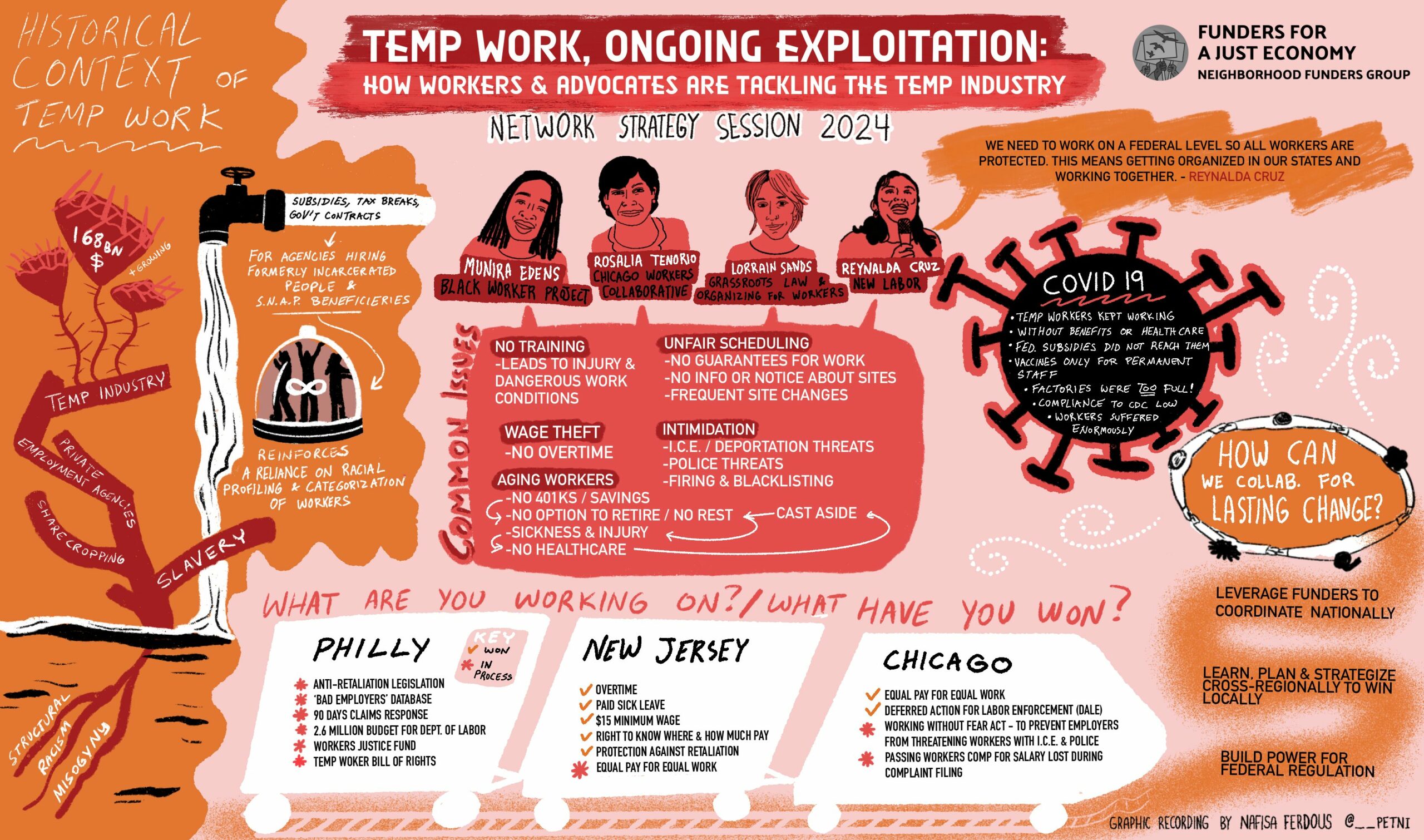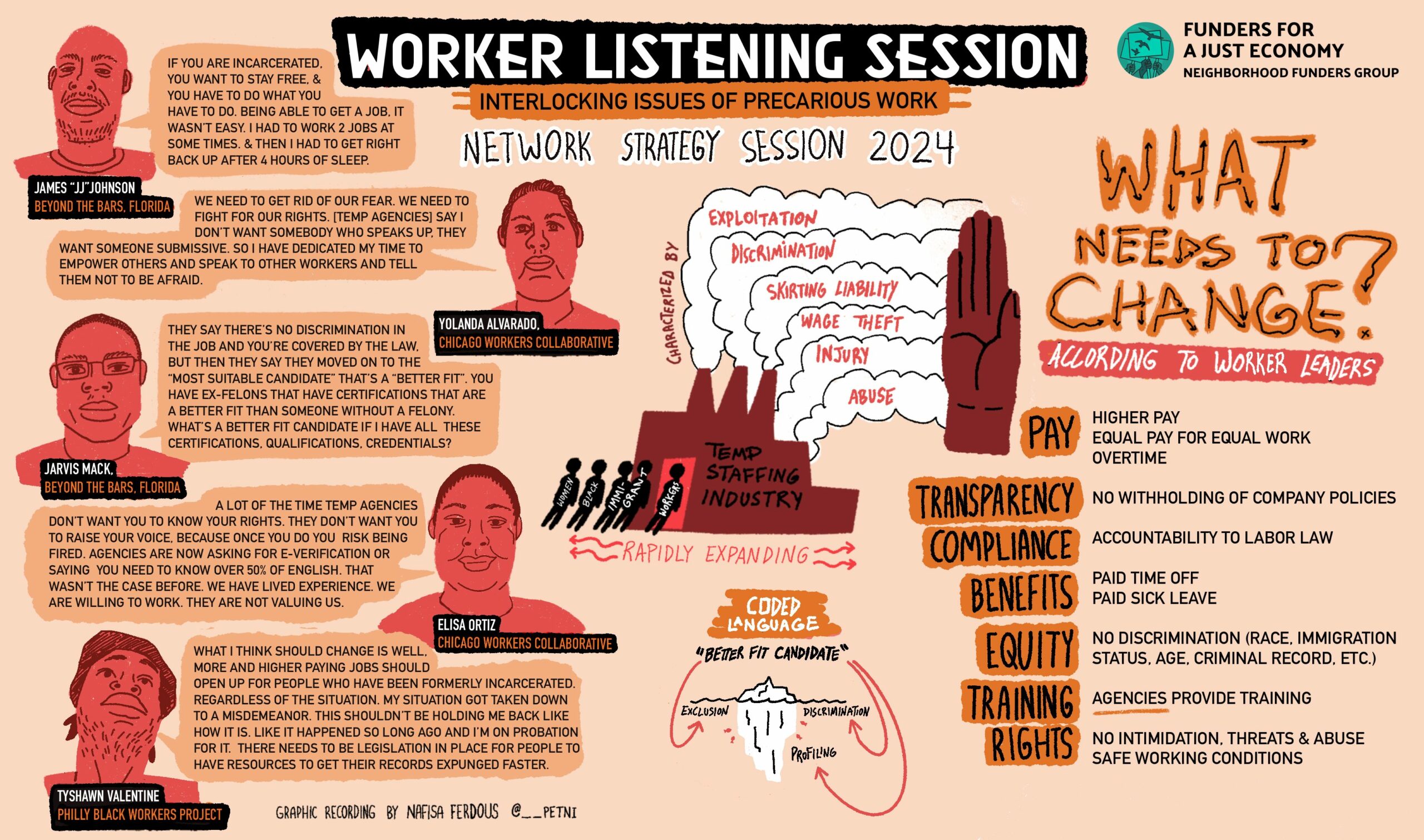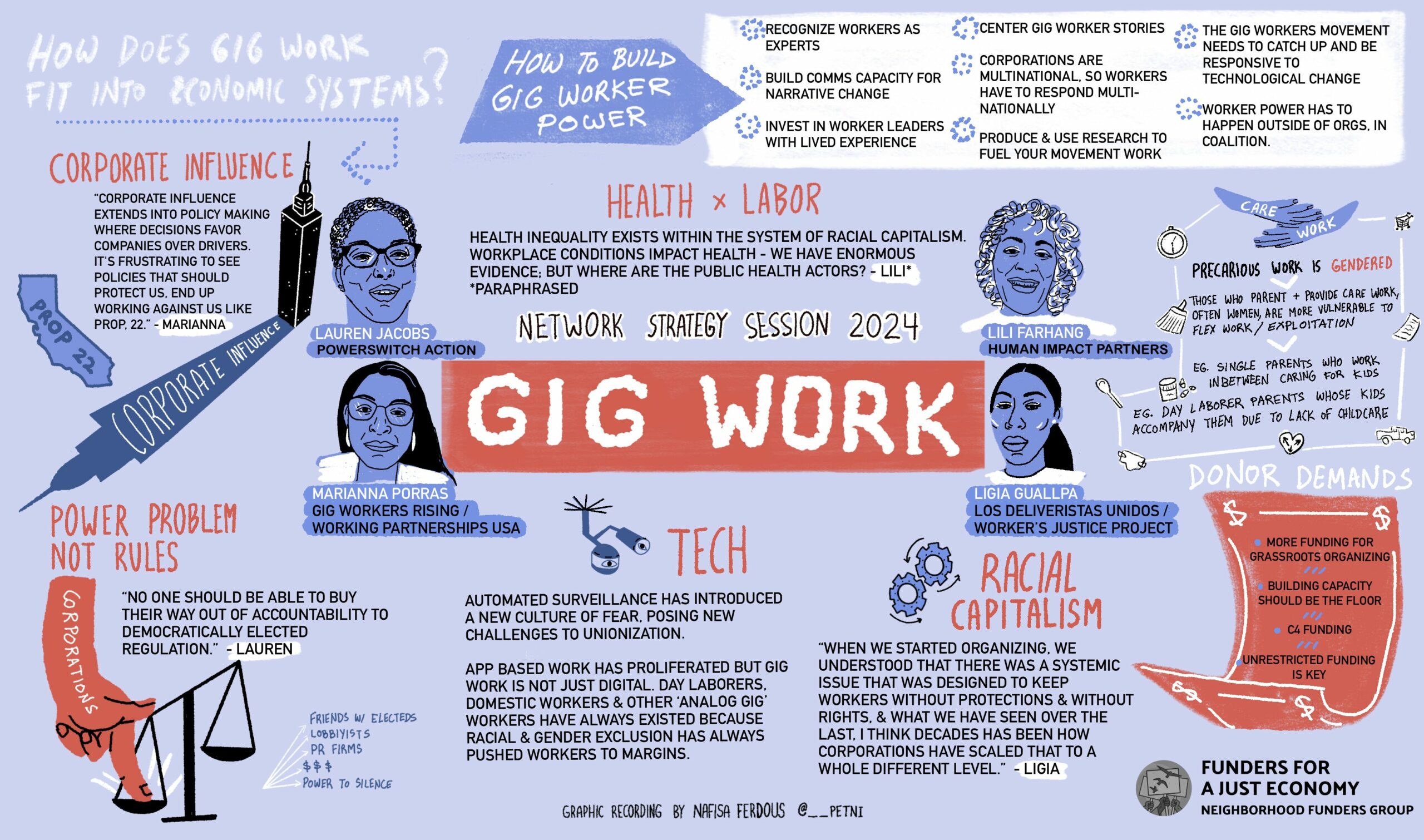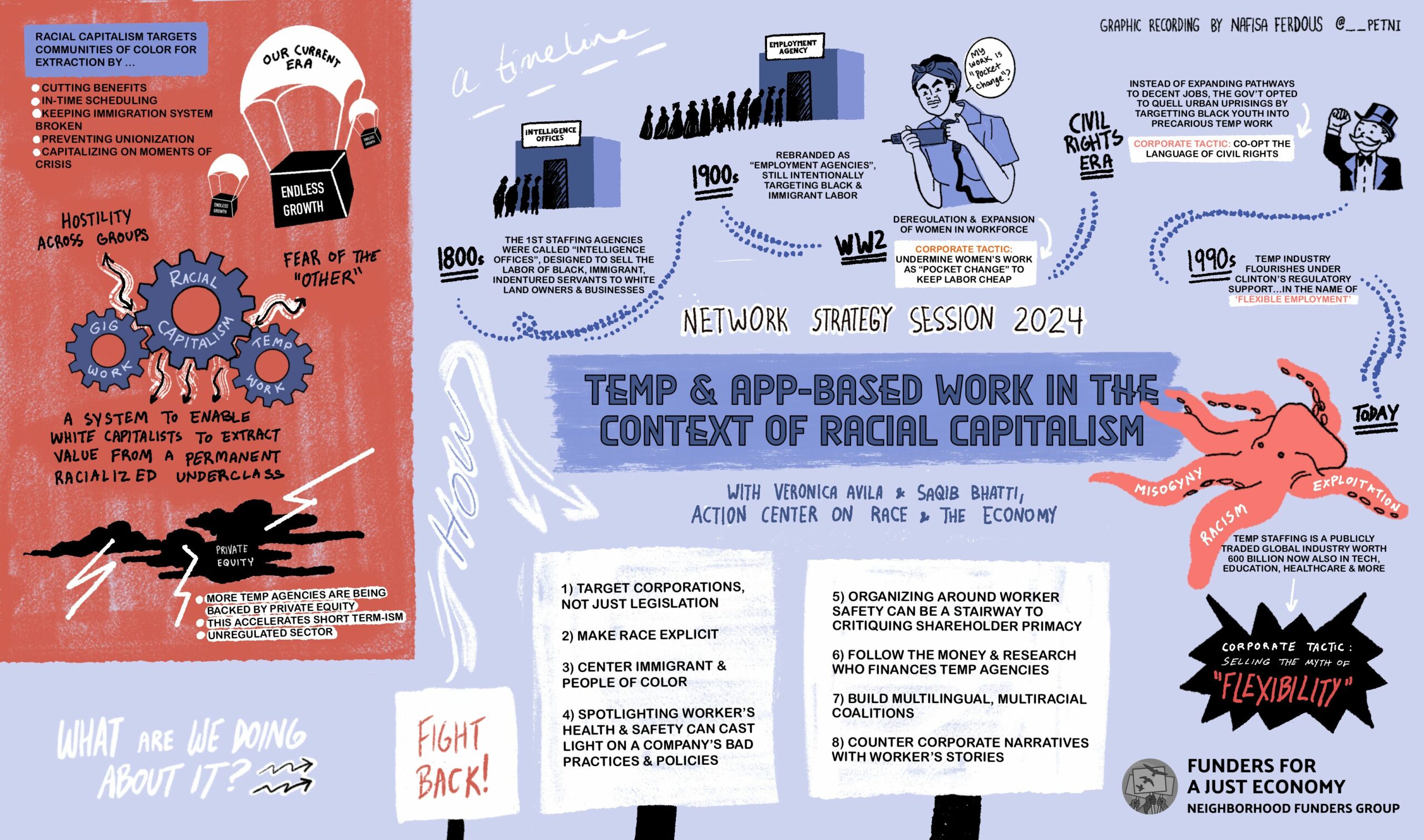Funders for a Just Economy’s Network Strategy Session brings together members and allies in a virtual community building, co-learning and strategy space. Every year we aim to learn from movement leaders on a specific theme or issue related to economic justice and worker power, grounded in a collective understanding of how racial capitalism, white supremacy and corporate power impacts our laws and policies, and how the philanthropic community can show up in partnership with transformative movements.
Our aim here is to build more bridges, share stories and perspectives, provoke new questions and integrate learnings into actions that shift grantmaking and build toward more collaboration or complementary work across the FJE network.
This year’s theme was “Interlocking Issues of Precarious Work.” Precarious is used to refer to a type of work that is poorly paid, unprotected, and insecure; and its relentless and systemic expansion is undermining the bargaining power and the conditions for all workers. The erosion of decent work has extended in industries beyond those that have codified precarious conditions in their model like care work, rideshares, food systems, logistics and warehouses; and into healthcare, media and entertainment, construction among others. This practice continues to spread- and women, people of color, low-income communities, migrants and people with disabilities are disproportionately impacted by these industry shifts.
Emerging from a deep history of racist labor practices dating back to enslavement and sharecropping, workers today in many sectors of the economy are forced to carry the brunt of this coordinated and proliferating practice of exploitation to maximize profits, limit liability for corporations, and lock out more and more workers from benefits, quality jobs and economic security.
On May 2024, Funders for a Just Economy gathered more than 50 members and allies at our Network Strategy Session to learn about:
- How labor flexibilization and precarity impacts all workers
- How workers are fighting back and are winning historic regulations in local and state levels
- Discuss how we can align our funding practices with the visions and aspirations of movement partners.
Continue reading for the entire event recap. Have the time? Listen and watch the sessions here.
Temporary Work, Ongoing Exploitation: How Workers and Advocates are Tackling the Temp Industry
Temp staffing, a $186 billion dollar industry, is responsible for employing over 14 million people in the U.S., touching virtually every industry. These often permanent temporary jobs are characterized by low wages, pay inequity, wage theft, unsafe working conditions, rampant discrimination, and a lack of benefits & job security.
During this session, we heard directly from workers as they shared their experiences working in the temp industry and from advocates as they discussed their ongoing efforts to expose the disparate impact temp staffing has on workers and communities of color, strengthen enforcement, and pass legislation to protect temp workers’ rights. Thank you to our following panelists who shared their wisdom, experiences, and hope for a different way of doing this work:
- Munira Edens, Philly Black Worker Project
- Rosalia Tenorio, Chicago Workers Collaborative
- Reynalda Cruz, New Labor
- Lorraine Sands, Grassroots Law & Organizing for Workers (GLOW)
- Dania Rajendra, The Forge (and BOD member at GLOW)
Temporary Work, Ongoing Exploitation
“There's no better place to start questioning and thinking about the shadowy corners of our economy than with temporary workers and their stories of courage in the face of deeply disturbing injustice. Their powerful stories, inspiring organizing, and beautiful visions for the future are everything that we need to bring fundamental rights to temporary work.”
Dania Rajendra, The Forge (and BOD member at GLOW)
A Short History of Temporary Work
To really contextualize the modern day temporary staffing industry, we have to pull at the threads that take us directly back to enslavement and sharecropping. Connecting this history to how modern day employment offices evolved and continue to operate demonstrates how racism, misogyny, and xenophobia remain crucial to their core purpose and function.
The temporary worker industry itself profits off the marginalization and exploitation of workers who already disproportionately face interlocking systems of oppression. Currently, the industry is a $186 billion dollar industry that continues to rely on the exclusion of working-class Black, immigrant, and women workers. According to the American Staffing Association, there are over 14.5 million temporary and contract workers hired by staffing agencies in the US and that is a quickly growing number, especially in the South. Temporary jobs are characterized by low wages, substantial pay inequity, wage theft, egregiously unsafe working conditions, and rampant discrimination.
It is important to note that while this industry is backed by private equity, it is also subsidized by public money. Many staffing agencies receive millions of dollars through government contracts each year and additionally receive tax cuts through tax credits, specifically the Work Opportunity Tax Credit. This allows companies to write off thousands of dollars each year if they hire people that face significant employment barriers such as formerly incarcerated individuals or folks that receive SNAP benefits (putting the most vulnerable communities at extreme employment risk). It has also come to light in this past year that temporary staffing agencies have been acting as a major source of child labor for multinational corporations like Tyson Foods, Honda, and others.
“There's a purposeful exclusion of workers from the more traditional job market that is forcing [workers] into temporary work that leads to jobs that are characterized by low wages and dangerous situations that can lead to folks feeling a real loss of self dignity, [mental decline and physical precarity] – and they are just out here trying to take care of their families and make ends meet. There's no reason that anybody who works full time and who's trying to take care of their family should not be able to do so.”
Lorraine Sands, Grassroots Law & Organizing for Workers (GLOW)
What Does This All Mean for Funders?
- Building relationships with workers and worker movement organizers is crucial to understanding the realities of temp workers. It is vital to bridge how organizations and funders can work together to further their aims and strategies so workers are protected and organized.
- Program officers depend on organizations like GLOW to bring folks together to confer, compare notes, and to figure out strategic alignment. Funding collaboration and community strengthens all movements – including the worker power movement.
- Flexible funding must be reimagined to support spaces for strategy, thinking, communing – even failing! There must be room in funding for folks to bravely try what hasn’t been tried before without retaliation or abandonment if a first attempt does not get organizations to exactly where they were trying to go. Success is incremental. Funding must see success and a learning arc as worthy of long-term, flexible funding commitments.
Worker Listening Session on Temp Work
During this session, we heard directly from five temp workers as they shared their real-life experiences working in the temp industry and the impact it has had on their lives and livelihoods. Thank you to our following panelists who generously opened up to us about their experiences and vision for philanthropic support of workers:
- James “JJ” Johnson, Beyond The Bars Florida
- Yolanda Alvarado, Chicago Workers Collaborative
- Jarvis Mack, Beyond The Bars Florida
- Elisa Ortis, Chicago Workers Collaborative
- Tyshawn Valentine, Philly Black Workers Project
What Temp Workers Want Us To Know
- Temporary staffing is a rapidly growing industry. More and more companies are outsourcing their labor to skirt liability laws and to increase their profit. This work is characterized by and thrives off the exploitation of and discrimination against largely Black, immigrant, and women workers.
- Temporary staffers experience increased injuries on the job, wage theft, and discriminatory treatment.
- Most temporary staffers have the qualifications and certifications for full time work – it is systemic barriers, discrimination, and inequitable laws that prevent them from receiving the full benefits and protections of the jobs they are already doing.
- Job insecurity in temporary staffing impacts the health of workers when they can never truly count on the work going forward. This leads to cultures of silence due to economic need superseding physical and mental wellbeing.
- Employers who use temporary workers actively work to obscure the rights of those doing temp work; those who do their own research and advocate for themselves and their colleagues are often retaliated against or fired and do not have the protections against said retaliation. This culture of fear and silence is by design.
“We have a purpose. We are changing our lives for the better and as workers we deserve to be paid. I have kids, so to be working at a temp agency and know I am getting less than half of what somebody else is making – it is debilitating and hurtful. It's unmotivating, it's unencouraging and it hurts. We need some kind of legislation push. We have to be given the chance.”
Jarvis Mack, Beyond The Bars Florida
What Can Philanthropy Do Better To Support Temp Workers?
- Funding. Funding worker-led organizations and national coordination between local groups who organize and advocate for their rights like equitable pay, overtime, paid sick leave, safe working conditions as well as robust enforcement mechanisms would materially change the lives of workers.
- Legislation. Shifting antiquated systemic barriers to work is crucial to the worker movement. Those working on policy need support to push back on everything from ableist requirements to barriers for formerly incarcerated, justice-impacted people and monolingual workers. However, legislative wins alone are not enough. Organizations need support to strengthen enforcement measures to hold agencies and host companies accountable, which would require resources to ensure workers are organized.
Industry-wide Shifts and Corporate Move Toward Gig Workers
Join us as we follow the history of gig work and the decline of worker protections as entire industries and sectors are shifting and adopting “gig work” (W2 and 1099) to increase profits and lock out more and more workers from benefits, quality jobs, and economic security.
During this panel we heard from advocates and worker organizers who are building the power of gig workers across sectors both regionally and nationally. Thank you to our panelists who brought their expertise and passion for advocacy to this discussion:
- Lili Farhang, Human Impact Partners
- Ligia Guallpa, Los Deliveristas/ Worker's Justice Project
- Lauren Jacobs, PowerSwitch Action
- Marianna Porras, Gig Workers Rising/Working Partnerships USA
“Yes, sure, there is a rules problem but that’s not the heart of the problem. We are plain and simple in a power problem. These companies dropped 220 million dollars to buy the legislation that they wanted…No one should be able to buy themselves out of accountability to democratically enacted regulations just on principle. It is completely anti democratic, it is authoritarian.. We just decided that there had to be a fight that was taken directly to the corporations as a means to reset the playing field to get on different footing with the companies so that we were in a better position… to win.”
Lauren Jacobs, PowerSwitch Action
Reflections on Gig Work
- The concept of gig work has historically existed for decades – we know this from the experience of immigrant and Black workers. They would rely on gig work as their main source of work because the system completely abandoned them and denied them basic labor protections. We know that domestic workers and day laborers became gig workers and were excluded from labor protections systemically as well.
- The acceleration of algorithmic technology and a ruthless corporate business model have given rise to gig work that's happening on private apps, platforms and through individually sourced labor.
- It is really important for us to recognize the impact of generative AI. It has the potential to make the future of work “gig work” for all of us. How that happens and what it means for all workers’ lives should be considered by worker justice movements.
- Gig work is having a tremendous impact on all workers. Corporations continually lobby and have pushed false narratives around flexibility: “You're the one in control, not an employer.” In actuality corporations are spending millions to exploit workers. This is having serious consequences on workers while creating a windfall of money for shareholders while diminishing worker protections.
Takeaways for Funders
- It is important for funders to think of how they can fund this work with a racial justice and gender justice lens – we must fund where the injustice is rooted.
- We need 3 things in order to win: money, people and data. Philanthropy must work alongside gig workers to support the future of worker power and structural transformation. And the truth is – there is currently no organized money at the national level, no nationally pooled fund to support the infrastructure for organizers addressing issues of gig work.
- We need to be organizing people on a mass scale; an organizational effort where people can have the power to not only make gains, but keep the gains that they have and to be a strong voice and setting the future of work.
- Fund partnerships and collaborations. Fund the organizing and base-building, research, advocacy and narrative work that fuels movements.
- Workers are the ones who are deciding their futures – fund their strategies. Fund their movements. Fund their stories. Fund their power.
Temp and App-Based Work in the Context of Racial Capitalism
Join us as we learn from workers and advocates tackling temp and app-based work in the context of racial capitalism. Thank you to the below panelists for sharing their analysis and advocacy with us:
- Veronica Avila, Action Center on Race and the Economy
- Saqib Bhatti, Action Center on Race and the Economy
“Temp work is a symbol of racial capitalism. We saw and continue to see that this sector is in line with the trend of corporations consolidating their control over the economy and our democracy.”
Veronica Avila, Action Center on Race and the Economy
What Should We Be Paying Attention To?
- The very first staffing agencies were called “intelligence offices'' that were started in the 18th century, which sold black and immigrant labor and indentured servitude to land owners and businesses. They offered terrible jobs that paid no to low wages, and intentionally targeted immigrants, Black and people of color communities. Only after emancipation in the early 20th century that they were rebranded to employment agencies.
- White women entered the labor market in World War II and temp agencies started to target them as sources of cheap labor. Temp agencies at this time pushed for more deregulation because these jobs were going to women who were branded as only needing extra pocket change, and not recognized as primary financial earners who needed and wanted full time jobs with benefits.
- Around this time, private equity started to enter the market significantly. Eventually temp agencies become publicly traded companies. In 2023, the global temp industry generated nearly 600 billion dollars, the majority of which came from the United States.
- Temp work is a symbol of racial capitalism. This sector is in line with the trend corporations have consolidated their control over the economy and our democracy.
- Racial capitalism is the use of racism as a technique for exploiting people in communities of color and othering them so as to stir up hostility amongst working class whites and further enable white capitalists to extract value from everyone else.
- Financialization is a new stage of capitalism where financial institutions have growing and outsized power and influence over every aspects of our economy or democracy, and personal lives.
- A business model that is committed to economic growth above all else, requires extraction of labor, wealth and natural resources in order to be more profitable each year. Black and immigrant communities have been targetted for this subtraction. Other ways that it transpires is through wage suppression, environmental racism, and tax avoidance.
- Over the last few decades the staffing industry and businesses like Uber and Lyft have based their business model on having lean overhead and distancing themselves, for from workers by flexing their political power to hollow out the employer-employee relationship.
- Temp work was the blueprint for gig work. We can think about temp work is the analog and gig work is the digital, however now they are mutually reinforcing each other.
- The “Shock Doctrine” strategy has been key in imposing these new business models to the workforce. Corporations tend to use moments of crisis to push for these pro-corporate measures. With temp work, it was World War II and the civil rights era. Uber began after the largest economic collapse in US history- the 2008 crisis. Additionally, during the recent moment of high inflation, Uber CEO also lauded inflation for pushing people into gig work.
A few questions to consider:
- How do we work across issue areas from climate, housing, worker rights, to take on private equity firms together?
- How do we develop capital strategies, capacities that traditionally existed within unions outside of unions and really apply them in the, you know, community and worker center models
- How do we have a strategy that is not just about divestment. If we are pulling our money out, where should it be invested? What are the investments that we need to make that will actually lead us to the kind of world we want to be building?
Posted 05/23/2024 in
Share




